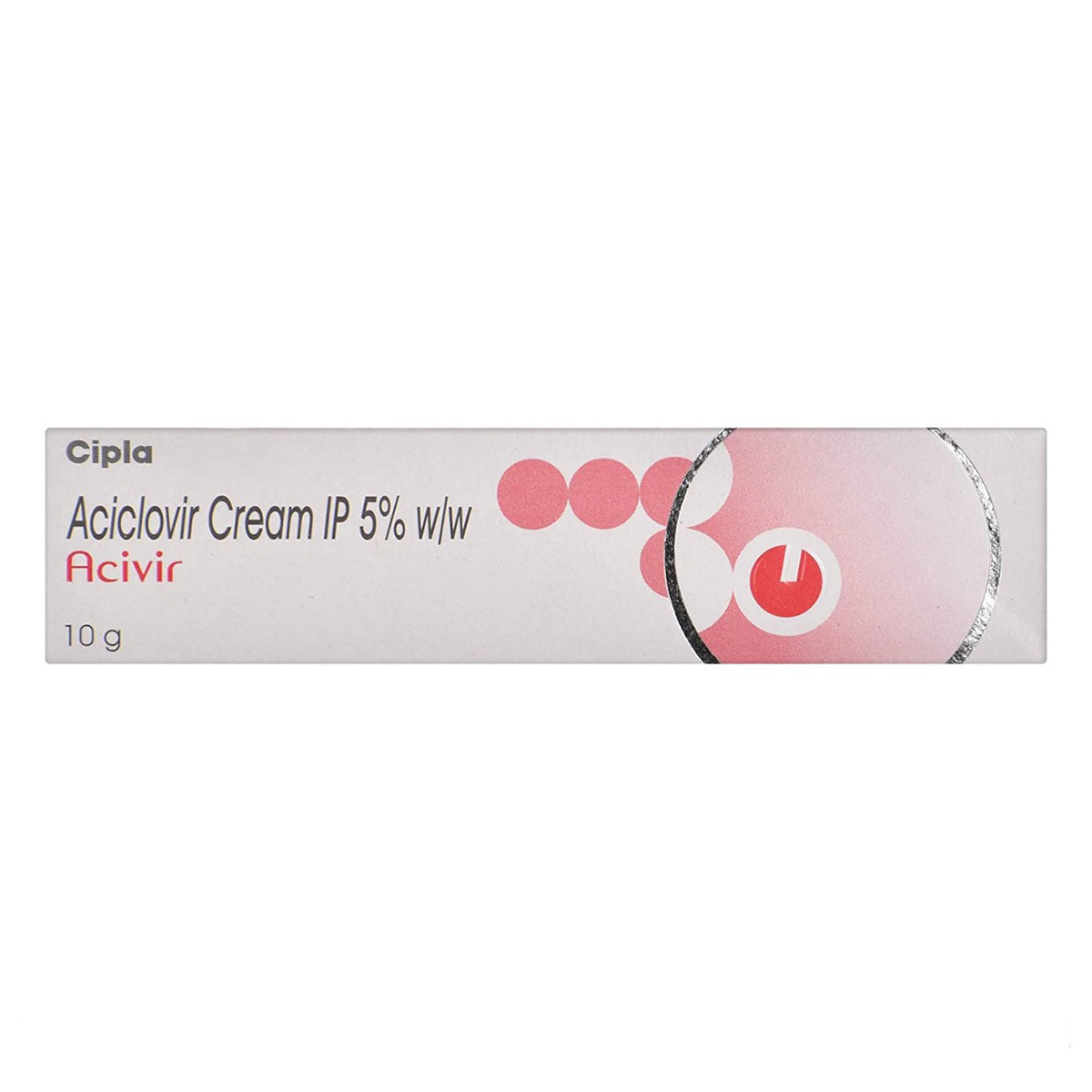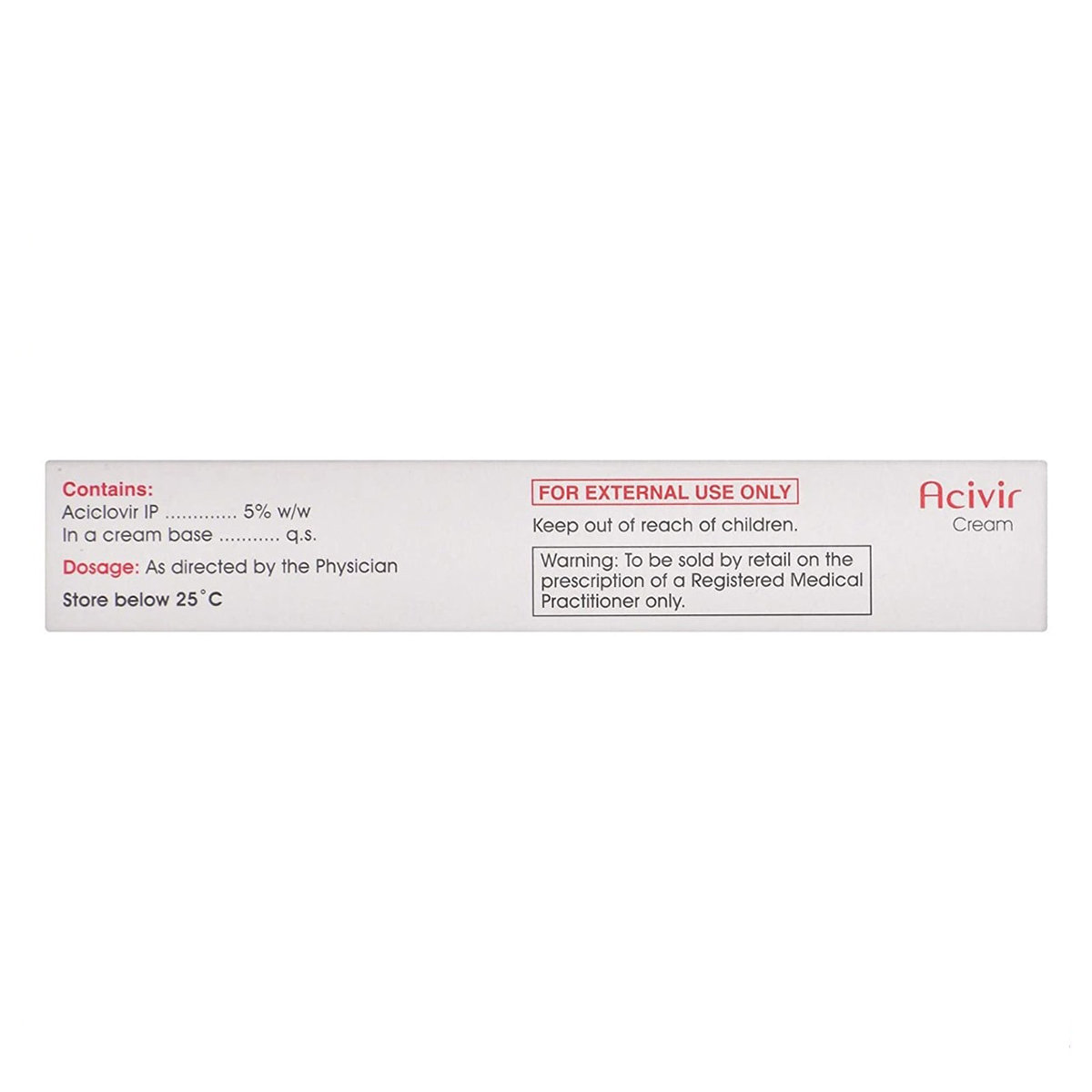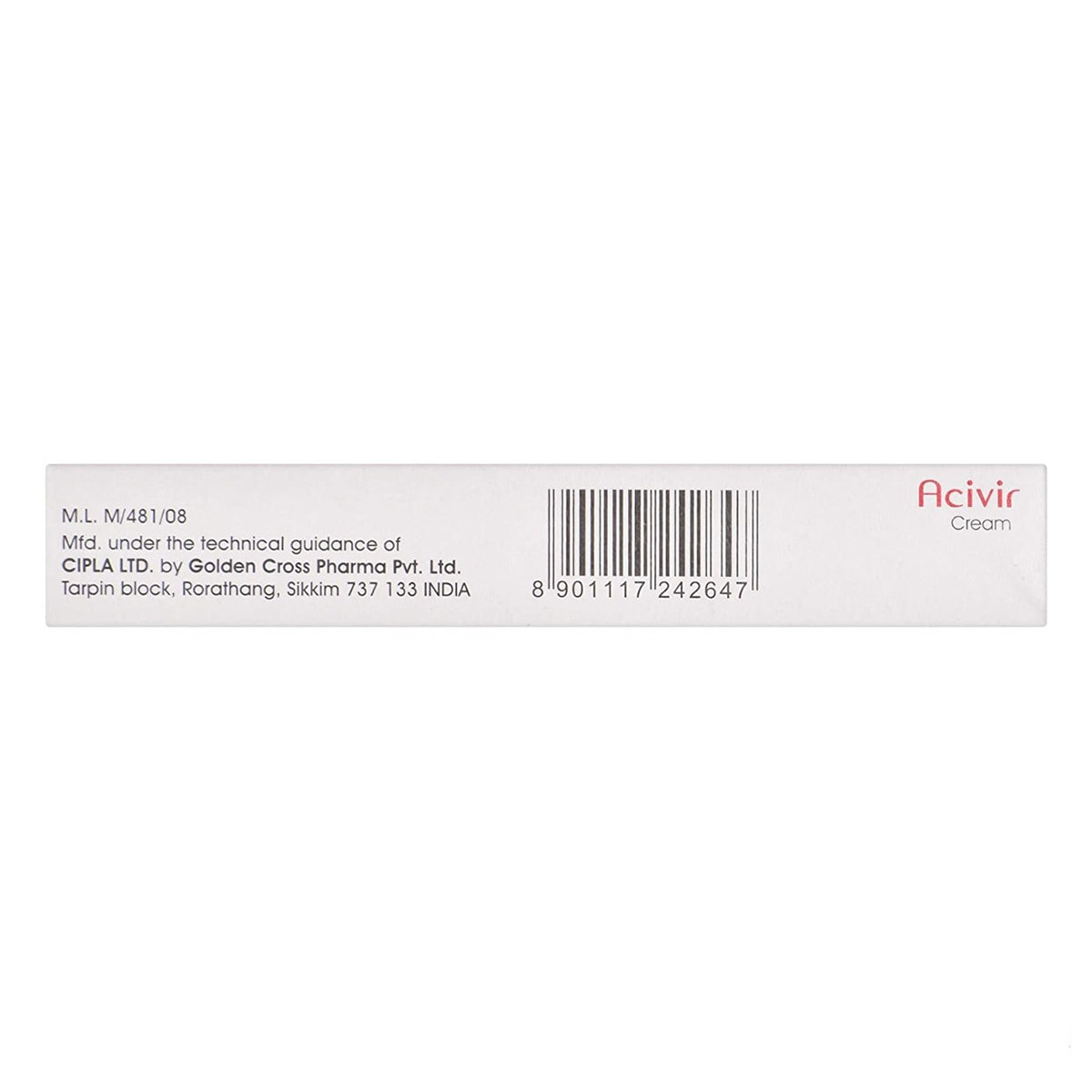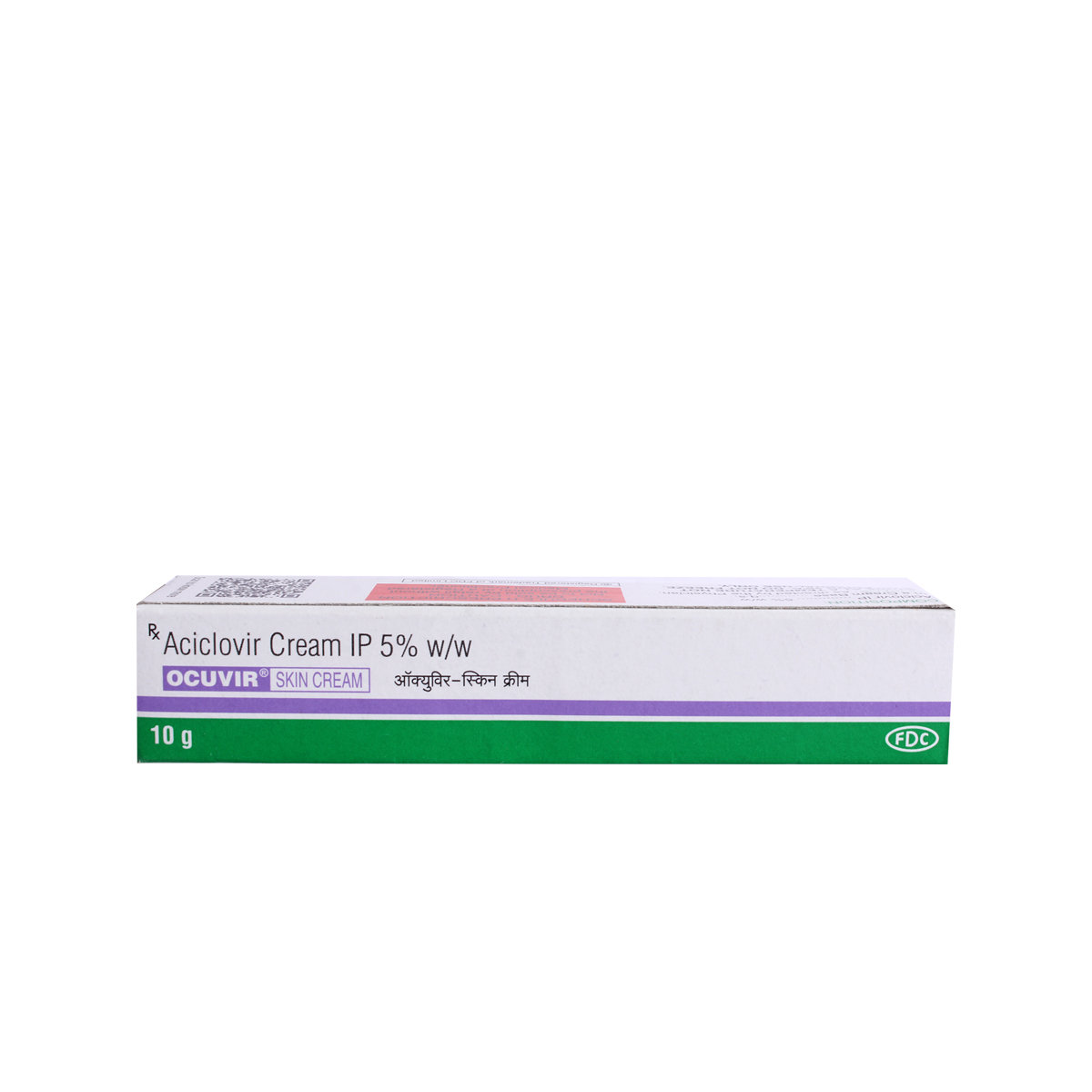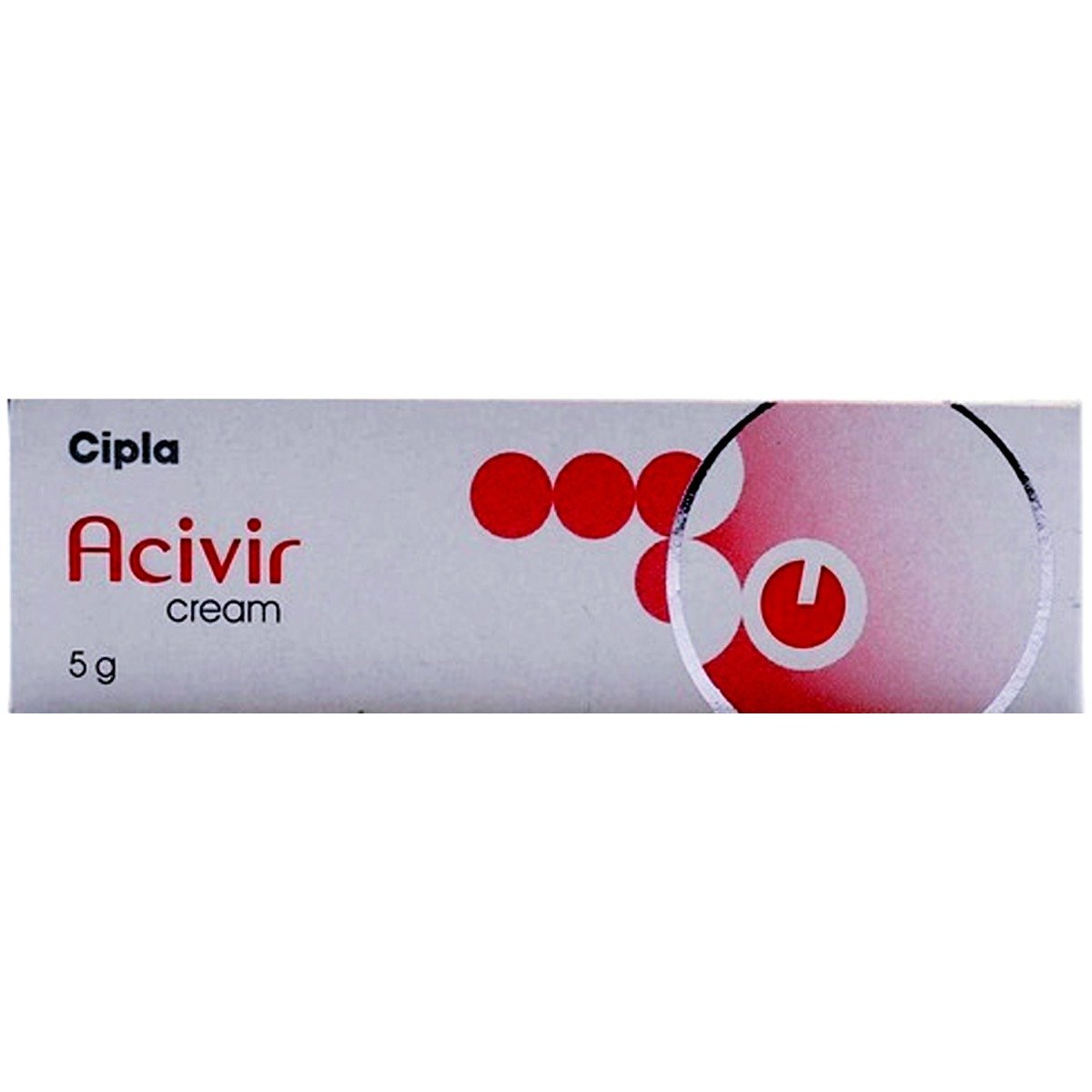Acivir Cream 10 gm
MRP ₹166
(Inclusive of all Taxes)
₹24.9 Cashback (15%)
Selected Pack Size:10 gm
10 gm ₹149.4
(₹14.94 per gm)
In Stock
5 gm ₹131.9
(₹26.38 per gm)
In Stock
Provide Delivery Location
Online payment accepted
 Prescription drug
Prescription drugWhats That
Composition :
Manufacturer/Marketer :
Consume Type :
Expires on or after :
Return Policy :
About Acivir Cream
Acivir Cream belongs to the class of 'antivirals,' primarily used to treat herpes simplex virus infections of the skin. It is used to treat genital herpes and herpes labialis/cold sores (herpes simplex virus infections of the lips and face).
Acivir Cream contains Aciclovir, which is an antiviral medicine. It works by killing and stopping the growth of the herpes simplex virus.
Acivir Cream is for external use only. Common side effects of Acivir Cream include dry/cracked lips, flaky skin, and temporary burning or stinging sensation. These side effects may not occur in every patient using this medication and gradually resolve over time. If the side effects persist longer or worsen, please seek a doctor's advice.
Let your doctor know if you are allergic to any medications. Acivir Cream is not intended for use on the mucous membranes, in the eye or inside the mouth or nose. Avoid contact of the tip of the dispensing tube with the infected areas and other surfaces to prevent contamination. Pregnant and breastfeeding women should consult their doctor before starting Acivir Cream. This medicine should be used in children only when advised by a doctor.
Uses of Acivir Cream
Directions for Use
Key Benefits
Acivir Cream treats viral infections of the skin caused by the herpes simplex virus. It consists of Aciclovir, an antiviral drug. It works by killing and stopping the growth of the herpes simplex virus.
Storage
- If you experience angioedema, inform your doctor immediately. Treatment can help keep the swelling under control.
- Seek medical attention if symptoms are severe, such as difficulty breathing or swallowing.
- Follow your doctor's instructions to manage symptoms, which may include stopping or adjusting the medication that triggered angioedema.
- Your doctor may also recommend antihistamines, steroids, or other treatments to reduce swelling and inflammation.
- Make dietary and lifestyle changes as recommended, such as avoiding trigger foods or reducing stress.
- Monitor your condition closely and track your symptoms to report them to your doctor.
- Consult your doctor again if symptoms worsen or do not improve or if you experience any new or concerning symptoms.
- If you experience or encounter any severe allergic reaction, stop using medication and consult the doctor right away.
- Tell your doctor about the allergic reaction, including the medication taken and any symptoms experienced.
- Your doctor will evaluate the severity of the reaction and determine the best course of action.
- To ensure a full recovery, follow your doctor's advice, attend scheduled follow-up appointments, and undergo recommended tests to monitor progress and adjust treatment as needed.
- Skin rash caused by allergies is due to irritants or allergens. Therefore, avoid contact with such irritants.
- Consult your doctor for proper medication and apply an anti-itch medication. Follow the schedule and use the medication whenever needed.
- Protect your skin from extreme heat and try to apply wet compresses.
- Soak in the cool bath, which gives a soothing impact to the affected area.
- Apply a gentle lip balm with ingredients such as castor seed oil or shea butter.
- Ensure you are hydrated by drinking plenty of water; this helps heal your lips.
- Avoid licking your lips or picking at them.
- Use a humidifier at home, particularly at night, to maintain moisture in the air.
- Protect your lips from sun exposure by using SPF lip balm and avoid using any irritating components.
- Stay away from metal objects that could irritate your lips.
- Consume a vitamin-rich diet to enhance the health of your skin overall.
- Apply moisturizer immediately after showering or bathing.
- Use a moisturizer containing lanolin, petroleum jelly, glycerine, hyaluronic acid or jojoba oil.
- Do not use hot water for bathing. Instead use warm water and limit showers and bath to 5 to 10 minutes.
- Apply a sunscreen with SPF-30 or higher.
- Avoid harsh soaps, detergents and perfumes.
- Do not scratch or rub the skin.
- Drink adequate water to prevent dehydration.
- Wear pants, full sleeves and a wide-brimmed hat while going out in the sun.
Drug Warnings
Inform your doctor if you are using prescription or non-prescription drugs, and herbal products before starting Acivir Cream. Let your doctor know if you are allergic to Acivir Cream or its inactive components. Keep your doctor informed of your medical history before starting Acivir Cream. You are advised to take proper precautions if you are infected with herpes to prevent the spread of infection to others through sexual contact or body fluids. Pregnant women should consult their doctor before using Acivir Cream.
Drug-Drug Interactions
Drug-Drug Interactions
Login/Sign Up
Drug-Food Interactions
Drug-Food Interactions
Login/Sign Up
Diet & Lifestyle Advise
- Manage stress, eat healthily, drink plenty of water, exercise regularly, and get plenty of sleep.
- Eat foods rich in antioxidants, such as berries, spinach, kidney beans, dark chocolate, etc.
- Eat a healthy and balanced diet. Eat vitamin and nutrient-rich food such as dark green, yellow, orange, and red vegetables and fruits as it helps to boost your immune system.
- Opt for lean protein and whole grains.
- Practise safe sex by using condoms; it helps reduce contact with body fluids from an infected person.
- Never share personal items that can have your body fluids or blood on them, such as razor blades or toothbrushes.
- Avoid sharing used needles, other injection or drug equipment.
- Get tested for other sexually transmitted infections.
Side Effects of Acivir Cream
- Dry/cracked lips
- Flaky skin
- Temporary burning or stinging sensation
Habit Forming
Therapeutic Class
All Substitutes & Brand Comparisons
RX
Ocuvir 5% Skin Cream 10 gm
FDC Ltd
₹112
(₹10.08/ 1gm)
32% CHEAPERRX
Out of StockAcylovir Cream 10 gm
Prevego Healthcare & Research Pvt Ltd
₹146.3
(₹14.63/ 1gm)
2% CHEAPERRX
Herpex 5% Cream 5 gm
Torrent Pharmaceuticals Ltd
₹101.5
(₹18.28/ 1gm)
22% COSTLIER
Author Details
We provide you with authentic, trustworthy and relevant information
Drug-Diseases Interactions
Drug-Diseases Interactions
Login/Sign Up
Acyclovir should be used with caution to patients who have impaired kidney function. In patients with moderate to severe renal impairment, dosage modifications are advised.
How to manage the interaction:
The use of Acivir Cream 10 gm in kidney disease patients is not advised as it may increase the severity of kidney disease. Your doctor may adjust the dosing according to the severity of your kidney disease.
Patients who are dehydrated may be more susceptible to nephrotoxicity from using acyclovir. Acyclovir should be infused intravenously over the course of an hour, along with appropriate hydration.
How to manage the interaction:
Acivir Cream 10 gm is excreted through the kidneys, dehydration may cause damage to kidney functions. Acivir Cream 10 gm infusion over an hour is recommended in dehydrated patients. Urine output should be monitored.
Hemodialysis effectively removes acyclovir from the body. Following 6 hours of dialysis, it has been demonstrated that plasma levels of acyclovir decrease by 60%. After hemodialysis, acyclovir should be administered. If not, a second dosage might be administered following each hemodialysis session.
How to manage the interaction:
Patients undergoing hemodialysis should be given Acivir Cream 10 gm after completing hemodialysis as hemodialysis removes 60% of Acivir Cream 10 gm from the body.
FAQs
Acivir Cream consists of Aciclovir, an antiviral drug. It works by killing and stopping the growth of the herpes simplex virus.
Acivir Cream should be used with proper caution and doctor consultation if you have any allergic reactions to medicines, liver or kidney diseases, or weakened immune system in cases like HIV infection, bone marrow transplant or cancer treatment.
It is not recommended to use both oral and topical antiviral medicines concomitantly since it may lead to overdose. Your doctor will prescribe you the right choice of medication depending on the type and severity of the infection.
Avoid contact of the tip of the dispensing tube with the infected areas and other surfaces to prevent contamination. Do not apply the product on the mucous membranes, such as inside the mouth or vagina, or on the eye.
Disease/Condition Glossary
Herpes simplex infection: It is commonly known as herpes, a viral infection that causes contagious sores, often around the mouth or genitals. It is caused by the herpes simplex virus. There are two main types of herpes: herpes simplex virus/HSV-1 and HSV-2.
HSV-1 causes oral herpes/herpes labialis and can be transmitted through oral secretions or sores on the skin. It is also spread through kissing or sharing personal items like toothbrushes or eating utensils. Symptoms of HSV-1 include cold sores (fluid-filled lesions) or fever blisters around the mouth or on the face and a tingling or burning sensation.
HSV-2 causes genital herpes, which can be transmitted by direct contact with body fluids or sores/lesions of a herpes-infected individual. Genital herpes is a sexually transmitted infection, and its symptoms include herpetic sores (painful fluid-filled bumps) on the genitals or around the anus, pain, and itching or burning sensation.

Have a query?
Alcohol
Safe if prescribed
It is not known whether alcohol interacts with Acivir Cream. Please consult your doctor.
Pregnancy
Consult your doctor
If you are pregnant or planning pregnancy, consult your doctor before using Acivir Cream.
Breast Feeding
Consult your doctor
Limited data are available on the use of Acivir Cream in breastfeeding women. Please consult your doctor before using Acivir Cream if you are breastfeeding.
Driving
Safe if prescribed
Acivir Cream has no influence on the ability to drive or operate machinery.
Liver
Consult your doctor
Consult your doctor if you have any history of liver diseases or hepatic impairment before using Acivir Cream.
Kidney
Consult your doctor
Consult your doctor if you have any history of kidney diseases or hepatic impairment before using Acivir Cream.
Children
Safe if prescribed
Acivir Cream should be used for children only when advised by a doctor.

